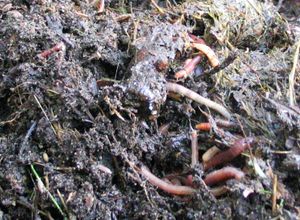Difference between revisions of "Compost"
| Line 10: | Line 10: | ||
Composting generates heat and consumes Oxygen, Nitrogen, Carbon and Water. | Composting generates heat and consumes Oxygen, Nitrogen, Carbon and Water. | ||
| − | ==Humans as compost== | + | ==Humans as compost, funeral rites== |
| + | |||
| + | [[funeral|Dead bodies]] may be a part of compost. But recycling the dead might be more ceremonial than practical. Each setter consumes about 2.7 kg of food per day, and rejects 2kg of waste. This is about 730 kg per year, or over ten times the settler's body mass. For a life expectancy of 80 years, a colonist would produce 58 tonnes of waste. Add to this a volume of biomass, that should be close to the mass of food, or about 78 tonnes, to complete the compost and recover inedible plant parts, and for a 70 kg colonist the equivalent soil production might be 136 tonnes, or 2000 times more. In such a case the input from the human's body mass would be very small. | ||
| − | |||
[[Category: Agriculture]] | [[Category: Agriculture]] | ||
Revision as of 05:59, 26 April 2023
Compost is vital in growing plants. Compost can be made from organic waste, and enriched with chemicals such as ammonia.
Biomass from food production can also be included in compost as well as animal wastes. Most compost is biomass. Compost will be competing for use of biomass with the plastics industry.
Contamination of compost needs to be addresses as the compost minerals end up in the food chain.
Composts that include biological and meat wastes should be heat treated to kill dangerous bacteria.
Composting generates heat and consumes Oxygen, Nitrogen, Carbon and Water.
Humans as compost, funeral rites
Dead bodies may be a part of compost. But recycling the dead might be more ceremonial than practical. Each setter consumes about 2.7 kg of food per day, and rejects 2kg of waste. This is about 730 kg per year, or over ten times the settler's body mass. For a life expectancy of 80 years, a colonist would produce 58 tonnes of waste. Add to this a volume of biomass, that should be close to the mass of food, or about 78 tonnes, to complete the compost and recover inedible plant parts, and for a 70 kg colonist the equivalent soil production might be 136 tonnes, or 2000 times more. In such a case the input from the human's body mass would be very small.







